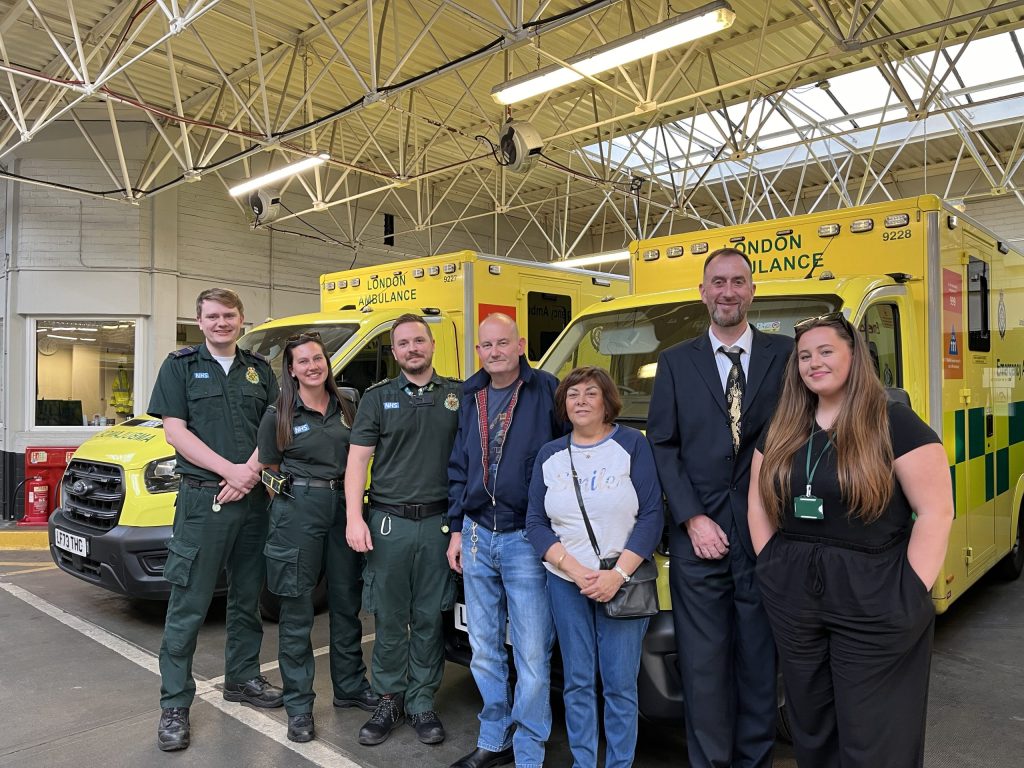Black cab driver brought back to life raises thousands for life-saving defibrillators
A black cab driver whose heart stopped for 20 minutes has thanked the paramedics at Wimbledon Ambulance Station who came to his rescue after he suffered a cardiac arrest at a martial arts class.

Paramedics restarted Paul White’s heart using a defibrillator – a device that resets a person’s heart by sending it an electric shock when their heart suddenly stops.
And following his recovery Paul, 64, and his wife Paula, 68, raised over £1,000 with their neighbours by taking on the London Ambulance Charity’s first ever fundraising walk – the London Life Hike. Funds raised by the hike will help install live-saving devices in the deprived areas of London that need them most.
The walk has raised £33,000 and counting for the charity’s new London Heart Starters campaign, which aims to improve survival rates for people who experience a cardiac arrest by purchasing additional defibrillators where they are most needed.
Paul, who lives in Croydon with Paula, collapsed at a church hall and his class instructor Paul Hughes immediately dialled 999 and performed chest compressions. Paramedics arrived in minutes and used a defibrillator from their kit.
Paul said: “If it wasn’t for their help and the use of a defibrillator, it would have been a very different outcome. I’m really fortunate that I’m still alive and didn’t suffer brain damage.”
Paul, a black cab driver for 25 years, added: “Sadly, I won’t be able to drive a cab again but have retained the Knowledge that cabbies need, so I’ll always be a cab driver at heart.”

His wife Paula said: “It was such a shock. He went off to work at 2 o’clock and at 10 o’clock at night I had the police at my door telling me that they were blue lighting Paul to St George’s Hospital where he was in a critical condition.
“At first I thought the police were informing me of his death.”
She continued: “Defibrillators and chest compression do work and he is living proof of it. If you perform CPR and use a defibrillator in time and do it correctly, people can still be here.
“I cannot thank the ambulance crews enough. They persevered, shocked him eight times and now I have my husband back.”
After two weeks in St George’s intensive care unit Paul was transferred to the Royal Brompton Hospital in Chelsea where surgeons replaced his heart valves and inserted an implantable cardioverter-defibrillator (ICD) into his heart to keep it at a normal rhythm.
Paramedic Laura Smith, who was the first to arrive on scene with her crewmates John Beer and Millie Hurst, said: “I’m so please that Paul is doing so well and has made an excellent recovery. I joined the ambulance service in hope of stories like Paul, to be able to save someone’s life not only for themselves but also for their loved ones like Paula.
“With every patient we do our absolute best to make that happen.”
Recent analysis by the London Ambulance Service has revealed that dozens of neighbourhoods are ‘defibrillator deserts’ – where there is little or no access to a life-saving device.
The data has revealed large discrepancies between communities in outcomes for cardiac arrest and the availability of life-saving devices. Households in more deprived areas are more likely to be in an area in greater need of additional defibrillators.
Help us raise money for our life-saving Heart Starters campaign on our dedicated London Ambulance Charity website here.

Follow us on social media: